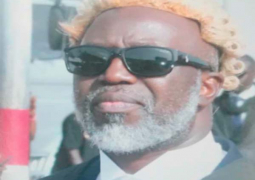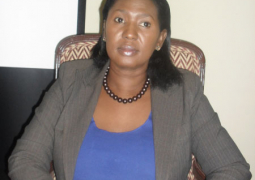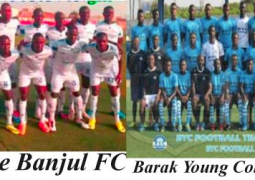Considering
the media terrain in The Gambia, the BBC Sierra Leone correspondent has stated
that journalists in The Gambia have been among the bravest in the world.
In addition to the laws of false information, sedition, libel and slander and other legal and legislative impediments, the arrest, exile and other intimidation tactics of the state have made the practice of journalism in The Gambia extra risky.
“Practicing the trade [journalism] in The Gambia has not been easy, especially in the recent past, but I salute Gambian journalists for continuing to keep pushing despite,” Mr Fofana said in an interview with The Point newspaper yesterday.
The BBC correspondent, who is in the country to cover the ongoing political impasse following the 1st December presidential election, was at The Point to pay a courtesy call on the paper’s management.
Widely hailed in The Gambia for his work, Mr Fofana said: “Gambian journalists are doing a lot better than I because they are here facing the challenges on a day-to-day basis whereas me as a foreign correspondent here have certain privileges that they don’t have. This makes Gambian journalists a lot more resolute, determined and bolder than I am.”
He further pointed out that it is a lot better practicing journalism in his home country, Sierra Leone, than it is in The Gambia because the former has a relatively free environment for the practice of journalism.
The tall and lanky man paid glowing tribute to the late co-founder and editor of The Point, saying the history of the Gambian media will not be complete without mentioning Deyda Hydara.
He also hailed Pap Saine for keeping true to the ideals of the paper and not giving up on the work he (Mr Saine) and the late Hydara started at the inception of The Point.
“Deyda Hydara should be smiling wherever he is now in his grave,” Fofana said, while expressing his resolve to work with The Point and the Gambian media in general to share his experience with the reporters as a way of enhancing their capacities.
He said he is open to work on collaborative projects in promotion and enhancement of journalism in The Gambia, adding that whenever the need for such arises he would make himself available.
Election sample
The BBC correspondent said as he goes about his coverage in The Gambia, he had observed and is impressed with the way people in the country conducted themselves during the election.
“There are not many countries in the world where you will go to and after the announcement of election results you don’t see shops and homes being attacked, or bullet and teargas being fired while the celebration is on,” Fofana said.
“The peacefulness of Gambia’s election is remarkable and Gambians should be proud of that and the contribution of the Gambian media to this was so remarkable. Gambians should maintain the peace because it is due to the peace that the Gambian economy, particularly tourism, continues to thrive.”
Second home
The Sierra Leonean said he feels very much at home whenever he is The Gambia because the two countries have a lot of things in common.
“I believe that as a Gambian, unless you have been to Sierra Leone, your ‘Gambianess’ is not complete; also as a Sierra Leonean, unless you have been to The Gambia, your ‘Sierra Leoneaness’ is not complete,” Fofana said.
“There is a lot that we share in common, and for me The Gambia is my second home.”
There is a sizeable community of Sierra Leoneans in The Gambia who have settled down in the country with their families and there is a cordial state-to-state relationship but the BBC Sierra Leone correspondent noted that the two countries have not fully tapped the resources they have in common.
Read Other Articles In Article (Archive)
Man Arraigned for Injuring Younger Brother with a Cutlass
Mar 18, 2009, 6:17 AM




